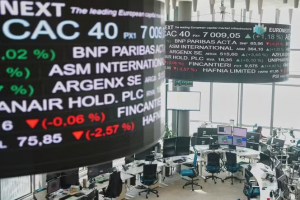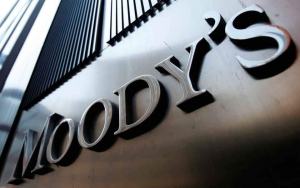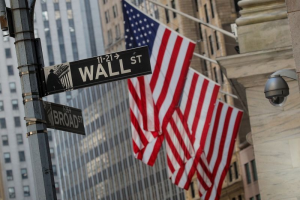US stock futures decline as traders eye ongoing violence in the Middle East. Iran says its air bombardment on Israel is over, although Israeli leaders have vowed a response to the attack. The assault, itself a retaliation to Israeli strikes on Lebanon-based Hezbollah, dented equities on Wall Street in the prior session.
1. Futures lower
US stock futures pointed lower on Wednesday as investors fretted over escalating tensions in the Middle East that weighed heavily on equities in the prior session.
By 03:42 ET (07:42 GMT), the Dow futures contract had fallen by 111 points or 0.3%, S&P 500 futures had lost 8 points or 0.1%, and Nasdaq 100 futures had shed 30 points or 0.1%.
On Tuesday, the main indices on Wall Street slipped, dragged down by an Iranian missile attack on Israel. The 30-stock Dow Jones Industrial Average dropped by 174 points or 0.4%, the benchmark S&P 500 slumped by 54 points or 1.0%, and the tech-heavy Nasdaq Composite retreated by 279 points or 1.5% -- although the indices ended off their intra-day lows.
Despite the broader market weakness, shares in energy groups rose, mirroring a jump in oil prices. Defense stocks, including Northrop Grumman (NYSE:NOC) and Lockheed Martin (NYSE:LMT), also moved higher.
2. Iran says missile attack on Iran over
Iran has said that its barrage on Israel -- its largest ever on the country -- is over, but warned it would resume the attack if there are further provocations.
Meanwhile, Israel could launch a "significant" response in the coming days that may target oil output facilities inside Iran and other strategic sites, according to US news website Axios.
Israeli Prime Minister Benjamin Netanyahu has promised a retaliation to Tehran's airstrikes, saying in a statement on Tuesday that Iran "made a big mistake" and "will pay for it."
The US has also said there will be "severe consequences" for Tehran's actions, with Defense Secretary Lloyd Austin adding that Washington is "well-postured" to defend its interests in the Middle East.
Iran's assault was sparked by recent attacks by Israel on Lebanon-based Hezbollah as well as the ongoing war in Gaza, Tehran said. The US, the United Nations and European Union have called for a ceasefire in Lebanon, but fighting continued there early on Wednesday.
3. Oil soars amid Middle East violence
Oil prices rose Wednesday, continuing the previous session’s sharp gains as rising tensions in the Middle East raised concerns that crude output could be disrupted from this oil-rich region.
By 03:43 ET, the Brent contract climbed 2.6% to $75.50 per barrel, while U.S. crude futures (WTI) traded 2.8% higher at $71.80 per barrel. Both crude benchmarks surged more than 5% on Tuesday after Iran's attack on Israel.
Elsewhere, the Organization of the Petroleum Exporting Countries and its allies, known as OPEC+, is due to meet later in the session, but no changes to output are expected at this point.
US crude inventories fell by about 1.46 million barrels for the week ended Sept. 27, compared with expectations of a decline of about 2.1M barrels, according to data from the American Petroleum Institute. The official government inventory report is set to released on Wednesday.
4. Vance-Walz debate
US vice presidential candidates JD Vance and Tim Walz clashed over the qualities of their respective running mates and achievements of the last two administrations in their only debate on Tuesday.
Vance, the Republican vice-presidential nominee of Donald Trump, presented a polished defense of the former president, backing his economic record in particular.
Walz, who is on the ticket with Democrat Kamala Harris, was more halting at the outset of the debate, but found his stride when he hit out at Trump's repeated denial that he lost the 2020 presidential contest.
Although the conversation became heated at times, the encounter as a whole was notable for its relatively civil tone compared to a prior on-stage exchange between Trump and Harris last month.
5. Nike scraps annual guidance
Shares in Nike (NYSE:NKE) sank in extended hours trading after the US athletic apparel maker withdrew its full-year financial forecast and posted a 10% slump in quarterly revenue.
Oregon-based Nike said sales had dipped to $11.59 billion during the three months until the end of August. Analysts polled by Investing.com had anticipated $11.65 billion. Net income, meanwhile, fell by 28% to $1.1 billion.
The results come as Nike undergoes an executive-level shake-up that will see boss John Donahoe replaced by company veteran Elliott Hill. Donahoe had overseen a period of weak performance fueled by stiff competition in the $150 billion a year global sneakers market.
Chief Financial Officer Matthew Friend said Nike's decision to scrap its fiscal year 2025 guidance was due to the upcoming leadership transition. Nike will instead give quarterly forecasts, Friend added, with the company expecting to report an 8% to 10% decline in revenues in the current three-month period.













